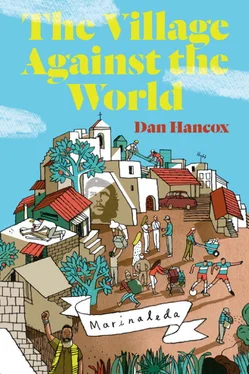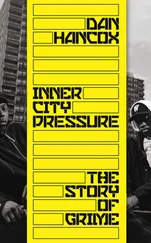It is into this environment that the anarchist philosophy of Bakunin and Kropotkin arrived in the second half of the nineteenth century and found a very congenial home. Theirs was the non-Marxist side of the First International: one that agitated for a working-class revolution and absolute equality, but believed that communism could only be achieved without a centralised bureaucracy, or any hierarchical power structures purporting to act on behalf of the workers. They believed in a federated network of equal but autonomous communities, operating without any interference from centralised power: anarchism described the Andalusian pueblos at their most radical, without even meaning to. In this respect, Marinaleda and its political lineage do not represent the communism of the hammer and sickle or Soviet-style centralism.
‘The power of elites,’ Sánchez Gordillo once said, ‘even when they call themselves leftists, is always a tyranny.’
The isolated nature of the Andalusian pueblos was even more pronounced in Gerald Brenan’s time. In the 1920s and 30s, Brenan spent many years living in the small peasant village of Yegen, in Andalusia’s Sierra Nevada mountains, recorded in his classic memoir South From Granada . His life there was one of contented detachment. In Yegen’s bubble-like totality and de facto self-governance (albeit under the undemocratic leadership of the bourgeois local politicians, the caciques ), he found both vitality and order:
This small self-sufficing world had something of the zest for life, and also the sense of measure and balance of the ancient Greeks. When I read in Plato how they had regarded their cities and political constitutions as works of art and had attributed to them not so much moral qualities as aesthetic ones, I thought I understood why this village, which was no smaller than many of the self-governing republics of the Aegean, proved so satisfying.
The result, he records, is that members of the pueblo almost never ‘left the peasant orbit and became merged in the life of the modern nation’. Politically, the local was everything: the newspapers might report dramatic events in Barcelona or Madrid, but no one in Yegen took the slightest bit of notice – the only news, personalities or politics that counted were those of the village; matters of national life were of no interest. For the Andalusian pueblos , Madrid represented a distant, inauthentic power, capable only of misunderstanding, and repressing, their way of life.
This level of isolation and autonomy is of course somewhat diminished in 2013, and in Marinaleda’s case, the availability of free wireless internet for all the village is one of Sánchez Gordillo’s proudest achievements. Such techno-positivity is commendable for what remains a small, old-fashioned community, but it might also be its undoing. Modern communications tell of the failures of the capitalist world outside, but they bring the tantalising offer of new possibilities, too. The big regional centres of Seville, Malaga and Granada are enticing some of the young marinaleños away from the fields. A few aspire to join the rest of Spain’s over-qualified juventud sin futuro (youth without a future) and leave the country altogether.
As capitalist Spain sinks (with two general strikes in 2012), it has raised Marinaleda higher than ever above the parapet. Five or ten years ago, when visiting the big cities of the south, I’d expect maybe half of the people I met to have heard of Marinaleda, and maybe half of those to care about it. It was, to many, an amusing Andalusian curiosity, a village of strange rural eccentrics and a testament to the unique political peculiarities of the region. They weren’t wrong.
These days, though, everyone in Spain has an opinion on the mayor and his project: it’s hard not to, when his face was in the newspapers and on TV every week. Sánchez Gordillo has become akin to what José Bové was in France around the turn of the millennium. Bové is the French farmer and trade unionist who was imprisoned for dismantling a newly-built McDonald’s in 1999, in protest at the way the American chain – and capitalism in general – was hurting rural France. He became an icon of the anti-globalisation movement around the time of Seattle, No Logo and the WTO protests, and similarly, Sánchez Gordillo has been catapulted from an entire lifetime of dedicated activism to the dubious status of a celebrity anti-establishmentarian. It is a wonder that the crisis – and the media that must keep the narrative of crisis interesting – has not created more icons of resistance, but one could certainly do worse than the mayor of Marinaleda.
Inevitably, his fame has prompted more press attacks than ever. Marinaleda has long had enemies; as its iconic figurehead, Sánchez Gordillo has survived two assassination attempts, many more attempts at character assassination, and been on trial, and in jail, more times than he cares to count. In the last year the sharks of the Spanish right have circled, growing ever more outraged at the expropriations and occupations. One of the most abstract, but most needling criticisms, is that the village is just ‘a communist theme park’, where the reality of life is little different from neighbouring villages. In this view the money is leeched from the regional government in Seville, and the self-conscious self-description of the village as ‘utopia’ really just means rural poverty plus a big painting of Che Guevara’s face on a wall.
As the crisis deepens, Sánchez Gordillo worries the elite that Alain Badiou called the ‘camarilla of inheritors and parvenus’. He worries them because in a western neoliberal world dependent on resigned submission to TINA – There Is No Alternative – he has one, and it seems to work. We may be in a new age of global revolt and assembly, but capitalist realist rhetoric keeps asking the same thing of its dissenters: what’s your alternative? It’s a rather terse rhetorical question: capitalist language is all about competition, but it doesn’t like competitors. From Puerta del Sol to Wall Street to St Paul’s, the damning questions rang out: ‘What are you for ? What are your demands? What’s your programme? How would it work in practice?’
Marinaleda presents an anti-capitalist answer to those questions, questions that Europe’s political and financial elites do not want answered. This community founded on mutual aid and collectivism, not the profit motive, has withstood the global financial crisis far better than its peers: 5 per cent of the town’s working population are unemployed, compared to 40 or 50 per cent in many nearby towns – and most of that 5 per cent are recent arrivals who have travelled to ‘utopia’ in search of work. When all around is misery, Marinaleda offers a glimpse of how things might be otherwise.
Just off Avenida de la Libertad is a metal arch painted in the village’s trademark red, white and green, declaiming in capital letters OTRO MUNDO ES POSIBLE – another world is possible. I have heard and read this slogan so many times in English, and it usually makes me feel slightly nauseous – it is too often an attempt to fire the imagination that serves only to remind you of the myriad failings of the world you live in. In most parts of the capitalist world, ‘another world is possible’ is just an idealistic rallying cry. In Marinaleda, it’s an observable fact.
Back in January 2012, sitting among the manic clutter of the mayor’s office, I asked Sánchez Gordillo about the motto which appears on the town crest, alongside a painting of white houses and a dove against a blue sky. Una utopia hacia la paz , it says: a utopia towards peace. He answered:
‘We’re trying to put in place now what we want for the future. But we don’t want to wait till tomorrow, we want to do it today. If we start to do it today, then it becomes possible, and it becomes an example to show others, that there are other ways to do politics, other ways to do economics, another way to live together – a different society.’
Читать дальше












